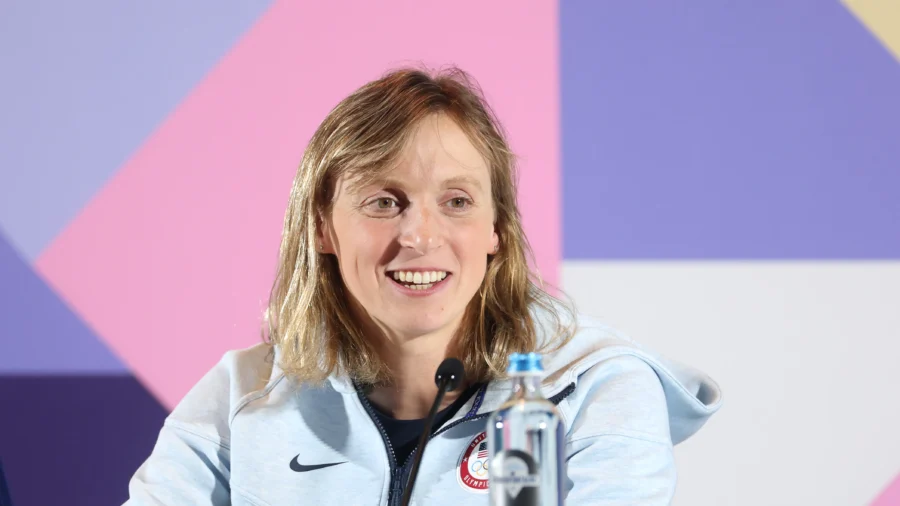Olympic swimmer Katie Ledecky hopes that athletes have trained and will compete “clean” at the upcoming Paris Olympics, referring to the 2021 case when Chinese swimmers failed doping tests but were permitted to continue to compete.
The FBI opened a criminal investigation into the doping case involving 23 Chinese swimmers during the 2021 Tokyo Olympics, and the International Olympic Committee (IOC) was not shy about expressing its dissatisfaction.
The IOC had said previously that an initial investigation had concluded that the banned substance found in the Chinese athletes was due to contamination in the food they consumed at a hotel before the Olympics and that it was not a doping scandal.
“I hope everyone here is going to be competing clean this week,” the six-times gold winner Ledecky said. “But what really matters also is: Were they training clean? Hopefully, that’s been the case. Hopefully, there’s been even testing around the world,” she said in response to a question at the Team U.S. Swimming press conference on July 24.
The 27-year-old American swimming star is competing in the 400, 800, and 1,500 meters at the Paris Games. Her schedule begins with the loaded 400 freestyle on Saturday, which also includes Ariarne Titmus and Summer McIntosh. This is her fourth Summer Olympics.
While awarding the 2034 Winter Olympics to Salt Lake City on July 24, the IOC pushed Utah officials to do what they could to stop the FBI probe.
“I think everyone’s heard what the athletes think,” Ledecky said. “They want transparency. They want further answers to the questions that still remain. At this point, we’re here to race. We’re going to race whoever’s in the lanes next to us.
“We’re not the ones paid to do the testing, so we hope that the people that are follow their own rules. That applies now and into the future.”
Ledecky won gold in the 800 free in each of the previous three Olympics. She also won the 200 free and 400 in Rio de Janeiro and the 1,500 in Tokyo. She remains a dominant force in the 1,500, but she is facing a more difficult challenge for the rest of her schedule in Paris.
The individual event she did not win was the 400, for which Titmus took the title. Meanwhile, McIntosh is a prime contender for both the 400 and 800.
With the 400 coming up on the first day of the swimming competition, Ms. Ledecky said she won’t attend the opening ceremony on July 26.
“I’m looking forward to the 400 free, day one,” she said. “I like my chances, but that’s me, and I feel like I’m prepared and ready to race, and that’s all you can ask for. … It’s obviously a great field. Top to bottom, lots of people that have a chance.”
Backstroker Ryan Murphy paid tribute to her on Wednesday, but Ledecky is uncomfortable with any praise coming from her U.S. teammates.
“She’s constantly pushing the envelope on how she can improve and it’s incredible for our sport,” Mr. Murphy said. “She’s one of the best of all time, so we’re really lucky to have her on our team as both an athlete and a leader.”
The International Swimming Federation says its top administrator has been ordered to testify as a witness in the U.S. criminal investigation into the case of 23 Chinese swimmers who failed doping tests in 2021 yet were allowed to continue competing.
Of the 23 Chinese swimmers, 11 are set to compete in the Paris Olympics.
The swimmers won three gold medals for China at the 2021 Tokyo Olympics, just weeks after the World Anti-Doping Agency declined to challenge Chinese authorities’ explanation of food contamination at a hotel to justify not suspending them.
Those decisions, which World Aquatics also reached separately, were not revealed until the New York Times and German broadcaster ARD reported on them in April.
The World Anti-Doping Agency (WADA) has since defended its handling of the case that was kept secret in 2021, saying it had no way to independently disprove the theory during the COVID-19 pandemic when travel to China was not possible.
“This scandal raises serious legal, ethical, and competitive concerns and may constitute a broader state-sponsored strategy by the People’s Republic of China to unfairly compete at the Olympic Games in ways Russia has previously done,” the Select Committee on the Chinese Communist Party said in the letter to the Justice Department and FBI.
On May 21, the Select Committee on the Chinese Communist Party asked the Justice Department and the FBI to investigate the case under a federal law called the Rodchenkov Act. This law allows for probes into suspected doping conspiracies, even if they occurred outside the U.S.
The case was also raised at a congressional hearing last month in which swimming great Michael Phelps said athletes had lost faith in WADA as the global watchdog trying to keep cheaters out of sports.
The Rodchenkov Act “was enacted in 2021 with broad athlete, sport and multinational governmental support because WADA could not be trusted to be a strong, fair global watchdog to protect clean athletes and fair sport,” U.S. Anti-Doping Agency chief executive Travis Tygart said.
WADA did not reply to a request for comment.
The Associated Press contributed to this report.

